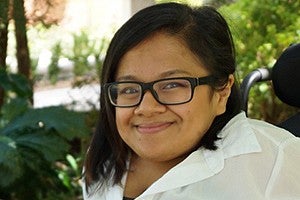
Olivia Mae M. Asuncion, AIA, MArch '13, is an architect on the move. She has been a passionate accessibility advocate all her life, even before she became an architect, as a lifelong mobility device user. Asuncion's educational and professional journey has been rooted in her experience accessing physical environments. She knows firsthand the impact that the physical environment has on independence and has committed to using her expertise to center the needs of users of all abilities. Her work as a project architect with Quattrocchi Kwok Architects (QKA) has been rewarded with recognition from the highest levels of the United States (US) government culminating in an appointment to the Architectural and Transportation Barriers Compliance Access Board last summer. Asuncion sought to further build on her expertise in the space with her Fulbright US Student Research Award on a research trip to the Philippines.
Her trip to the Philippines was an eye-opening experience that reset her understanding of the intersection of accessibility, government, and community desire. Asuncion is knowledgeable of the legal and policy frameworks that support accessibility and believed that governing bodies that mandate physical accommodations serve as the foundation for accessibility. Asuncion discovered in the Philippines that solutions for inclusive design and accessibility need to go beyond the letter of the law and require community buy-in and passion to be successful. While conducting site visits at elementary schools and the surrounding communities, Asuncion would find the accessibility of the locations to be inadequate and challenging with one particular school standing out to her for different reasons.
Cavite Institute is a private school that voluntarily added a Special Education program to its curriculum with only a month to adapt its physical spaces. With the tight deadline, lack of funding, and expertise, the facilities were largely inadequate for anyone with mobility concerns or experiencing a disability but their attitude and approach to the endeavor was a balm to Asuncion. The facility might have ramps that were too steep or only stairs for access in some areas, but the team was committed to providing for and serving all their students, regardless of ability. Asuncion noted that they were committed to providing a fully accessible experience if they only had the expertise and funding to pair with the passion. This shifted Asuncion's view on accessible design, recognizing that it needs to be approached from the lens of accessibility as a human right and need as opposed to fulfilling a punch list of codes and government mandates. The trip was transformative for Asuncion, who hopes to use the experience to great effect at conferences, events, and other speaking opportunities to motivate and inform future and current architects of the importance of adapting and integrating inclusivity in the design of educational facilities.
In addition to her work with QKA, Asuncion continues to publish research and collaborate with architecture professors at the College of Design's School of Architecture & Environment and was recently named one of San Francisco Business Times’ 40 under 40.
Read Olivia's Fulbright Story: https://www.fulbrightprogram.org/olivia-mae-asuncion/
